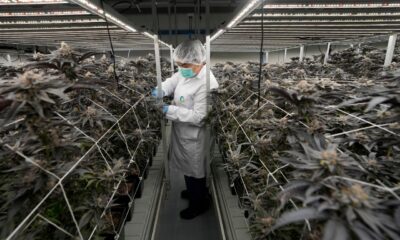Temperatures may be soaring this summer in Sin City, but cannabis consumption lounges have a more temperate forecast ahead of them.
More than a year after Nevada regulators approved the first consumption lounge licenses, only two state-licensed lounges have opened in the city. Smoke and Mirrors, which is run by Thrive Cannabis Marketplace, began welcoming patrons in February, while Planet 13’s Dazed! opened its doors in April.
The path to opening these lounges has been long, starting back in June 2021 when the state legislature passed a bill to allow the establishments. It took more than a year – until September 2022 – for the Las Vegas City Council to opt in to the law. It didn’t actually pass the ordinance to implement the lounge rules until March 2023.
On top of that, recent setbacks slowed progress to getting the industry segment off the ground. The Nevada Cannabis Compliance Board last week disqualified six of 10 social equity applicants selected in a 2022 lottery, citing residency requirement issues. The board plans a second drawing to fill the now-open slots, according to the Nevada Independent.
Additionally, there are 38 more lounges are in various stages of consideration, according to the CCB.
“It’s not a money maker”
Many folks in the industry have lauded the move toward allowing public consumption spaces, especially in tourist hot spots like Las Vegas. However, those directly involved have a different perspective.
Larry Scheffler, co-CEO of Planet 13 Holdings Inc. (CSE: PLTH) (OTCQX: PLNH), told Green Market Report that he views consumption lounges more as customer attractions than revenue generators. For one, Planet 13 lounge features some very Vegas-y design elements, including a secret entrance through an old English phone booth.
“It’s an overload almost on your senses,” Scheffler said during a January phone call.
At the same time, “It’s not a money maker in my eyes,” Scheffler noted at the time. He cited regulations that prevent customers from bringing in outside products and the typically low consumption volume versus alcohol in bars.
For example, the company has used the lounge as a bridge into professional sports, organizing meet-and-greet events with athletes and bring visibility to their offshoot brands, such as its P13 fight gear.
Planet 13 recently secured rights to show UFC pay-per-view events at its lounge and is pursuing deeper ties with the fighting organization. The eventual unicorn is hosting big-ticket bouts at their complex.
“We want to be there. Like, we want Planet 13 to be a sponsor of the UFC,” Derek Gumin, the company’s national wholesale director, said.
Adding a 60,000-square-foot nightclub to its Vegas complex has also been on the wish list for a while now, which would bring its total facility space to about 150,000 square feet.
“So, I think at a point, there’s nothing we won’t do,” Gumin said.
Scheffler said it would be the “last build out, but that wouldn’t be done until 2025.”
There’s also a tattoo lounge in the vicinity, with plans for podcast studios and a 14,000-square-foot, two-story interactive cannabis museum as “one more draw to bring them into the superstore,” Scheffler said.
The existing superstore already includes more than 70 cash registers, a Mexican-American restaurant, a full bar, a clothing store, and a production facility “where people can watch, a Willy Wonka-like chocolate factory, all the gummies and chocolates and drinks being made,” he said.
The company is also cooking up plans for a superstore in Miami pending recreational legalization in Florida.
Despite the challenges with the model and cannabis, optimism still reigns around consumption lounges. Christopher LaPorte of cannabis consulting firm RESET told the Independent in April that 70% of Smoke and Mirrors’ business comes from cannabis-infused drinks, which are ideal products for the model.
And as in the rest of the industry, the consumption lounge segment will likely see significant changes in how it operates as the overall market continues to evolve.

 California Cannabis Updates1 year ago
California Cannabis Updates1 year ago
 Breaking News1 year ago
Breaking News1 year ago
 best list11 months ago
best list11 months ago
 Bay Smokes12 months ago
Bay Smokes12 months ago
 cbd1 year ago
cbd1 year ago
 Business9 months ago
Business9 months ago
 Mississippi Cannabis News1 year ago
Mississippi Cannabis News1 year ago
 California1 year ago
California1 year ago












































